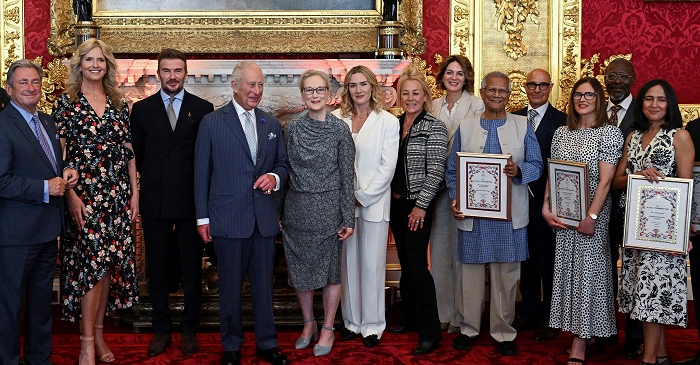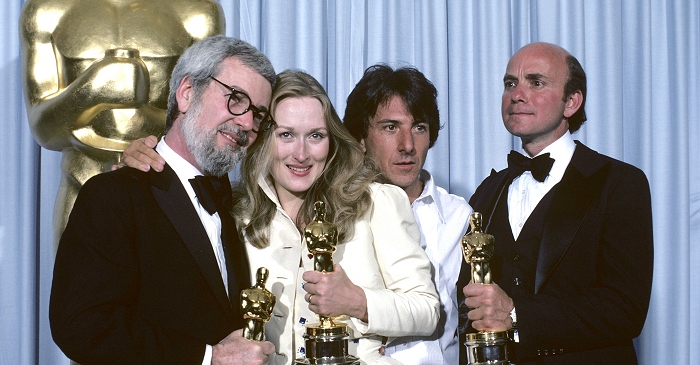|
Simply Streep is your premiere online resource on Meryl Streep's work on film, television and in the theatre - a career that has won her acclaim to be one of the world's greatest living actresses. Created in 1999, Simply Streep has built an extensive collection over the past 25 years to discover Miss Streep's body of work through thousands of photographs, articles and video clips. Enjoy your stay and check back soon.
|
|
Meryl Streep Takes Heart With Comedy
The Philadelphia Inquirer ·
July 27, 1986
· Written by Steven Rea
|
It’s late 1982, and Meryl Streep is busy being Karen Silkwood, the gum- chewing Oklahoma nuclear-plant worker exposed to radiation, who blows the whistle on the operation’s reckless safety violations cover-up. One night, Silkwood director Mike Nichols goes off to a screening of Streep’s soon-to-be- released Sophie’s Choice. Nichols sits in the theater, watching this mysterious woman with a Polish accent and a doomy, faraway look, and he can’t believe it. “It was extremely unnerving,” Nichols recalls, “because there wasn’t an inch of that woman that was familiar to me. Not a finger, not an eyelash, nothing! It was simply somebody else.”
Jump to mid-1985, and Meryl Streep is busy being Rachel Samstat, the engagingly whiny, two-timed heroine of Heartburn. Nichols, the director of the film based on Nora Ephron’s acerbic best seller (Ephron adapted her book for the screen), attends a preview of Out of Africa, directed by Sydney Pollack. He sits and watches the syphilitic Baroness Karen Blixen fend off lions on the savannah and minister to ailing Kikuyu servants. Here last month to talk up Heartburn, his Streep/Jack Nicholson comedy which opened nationally on Friday, Nichols recalled his reaction to Streep’s portrayal in his film and in the Pollack epic: “There’s a scene in Heartburn, when Rachel comes out of the bathroom and confronts her husband with evidence of his philandering. She says, ‘I know about you and Thelma Rice’ and . . . falls to her knees, sobbing. Well, I’d always thought that that was the real Meryl, that now we’re just looking at Meryl. “And then I see Out of Africa, and there’s the scene when she receives the news of (Denys) Finch Hatton’s death, and there’s just a barely visible tremor, and the smoking of the cigarette, and then she goes on reading and we think that’s the real Meryl . . . “She simply becomes different women . . . I don’t understand how she does what she does. I just know that she does it as well as I’ve ever seen it done.” It is June 1986 and Meryl Streep, her hair sandy and short, dressed in beige and browns, is being Meryl Streep – the two-time Oscar winner who, more than any other woman, has dominated American movies in the ’80s. She, too, is talking up Heartburn, her 6-week-old daughter tended to off in another room of the United Nations Plaza Hotel. A reporter reads back Nichols’ awestruck praise for the actress. She grins and shrugs – seemingly flattered and seemingly nonplussed, at a loss how to respond. Craft and hard work, she suggests. And the good fortune of working with people like Nichols and Nicholson. In Heartburn, Streep gets to do something she hasn’t done in some time: play a down-to-earth, contemporary American woman – no English or Polish or Danish accents, no mysterious Pre-Raphaelite stares, recurring “I had a farm in Africa” reveries.
And, she got to make a comedy.
“It just really struck me funny,” Streep says, remembering when she read Ephron’s first draft, sitting in a tent in the Kenyan desert midway through her 101-day stint on Out of Africa. “I’d been looking for something funny for a long time. But half the scripts I get I don’t think are funny. Half? Ninety percent of the things I get I don’t think are funny. Even the ones that are made, I sit there in the theater and think: ‘What are they laughing at? Am I alone here? I’m from Mars, probably.’ “But this was funny and it also had some impact, and that’s great. The combination is so nice. The movies that I love the most have humor in them, and yet are poignant, have substance.” And it was a chance to portray an American woman, living today. “That appealed to me, sure,” Streep agrees. “If the best script that came to me had been about another Danish woman, I might have thought two thoughts about it. But if that was the best thing around, I would’ve taken it. This was the best thing around.” “This” is a considerably reworked version of Ephron’s 1983 novel – the thinly veiled tale of the author’s marriage to and breakup with former Washington Post reporter Carl Bernstein. Streep found that the book – a fictionalized first-person, blow-by-blow account of the demise of the relationship – “left a sort of acidic residual taste. And then they sent me the script . . . and Nora had written maybe 15 times more than what eventually went into the movie. Very long. And it was wonderful. There was something that had been lifted out of it . . . it struck me differently. It didn’t have that taste to it. And I don’t think the movie does either.” Part of the change is that the film isn’t told in the first person, although Ephron and Nichols considered a narrative for a while (and Streep even recorded some voice-overs). Another factor – and a big one – is the casting of Nicholson as Mark Forman. The character, an insensitive lout in the novel, is far more sympathetically drawn than anyone – including the director and the writer – anticipated.
Nicholson came on board Heartburn following a false start with actor Mandy Patinkin in the lead. Although Streep and Nichols chose not to discuss Patinkin’s dismissal, it has been reported that he came off too “intense” for the comedy. (Nicholson did not participate in the Heartburn publicity sessions.) Streep thinks the film is stronger for Nicholson’s performance. “I think it makes the movie better, that he’s more sympathetic than anyone could’ve ever imagined,” she says. “I think it makes a stronger tension in the film. Because he is like our President, he’s such a likable person, but what he does is so horrible. And that makes for a great conflict. “Certainly, a lot of it was Jack,” Streep adds. “His infusion of charm and incorrigibility. You have the feeling about Jack that it doesn’t matter what kind of fence you put him in, he’ll find a way to get out and do his dastardly deeds – and you’ll still love him for it . . . “Anyway, I do think that was a wonderful stroke of luck, his being interested in us.” “This is the thing about Jack,” observes Nichols. “Jack several times has taken parts that looked small in the screenplay and/or were turned down by other actors, and then he simply exploded them with his presence. . . . What the actual words are becomes quite unimportant once Jack has shown up.”
Nichols says that he’d be happy “if I could just go on directing Jack and Meryl forever. It’s just a question of material, if we can find the material.” “For me,” he adds, “the excitement was the two of them. They brought to each other their excitement about the movie. The scene where they meet in the wedding was in fact the first scene we shot for the picture. They were very nervous and very up for the event. It was great to see these two people as nervous and as excited about each other as they were.” Nichols had intended that scene – where they sight each other across the pews of an old church (coincidentally echoing the scene in Prizzi’s Honor, when Nicholson spies Kathleen Turner at a church wedding) – to be the first time that the two actors would actually meet. But Nicholson, says Streep, scotched that. “There was this sort of manufactured nervousness because Mike didn’t want us to get together,” she says. “So dopey. He wanted us to really meet in the church – oh, come on! ‘But it’s a great opportunity,’ he’d say. ‘You’ve never met!’ And I said, ‘Well, I met him once, in 1978, and it’s not that big a deal.’ “Anyway, Jack sneaked over into my camper just before the first shot – ‘Hi, I’m Jack Nicholson’ (Streep does Nicholson’s demonic drawl) – to use my bathroom, so it sort of removed the romance from the whole thing very quickly. But I really didn’t know him when I walked into that church. We were quite new to each other, so that was fun.”
Nicholson and Streep hit it off so well, in fact, that the two are set to reteam in January for Ironweed, based on William Kennedy’s Pulitzer Prize- winning novel about down-and-outers in Albany, N.Y. Hector Babenco, who helmed Kiss of the Spider Woman, will direct. “Yeah, well, acting with Jack, it’s not like working,” says Streep, easygoing and relaxed. “You start feeling really guilty that you’re getting paid.” Streep cites her favorite sequence in the film – a sequence already singled out by critics – in which the two, celebrating Rachel’s pregnancy, decide to sing all the songs they can think of with “baby” in them. By the time it’s over, Nicholson is standing on the bed, bellowing show tunes from Carousel. “I just love that whole sequence,” she says. “And I have the sense that it wasn’t an effortful day. . . . “Jack is all over the place when he’s acting, and he’s flailing and jumping off the couch,” she says. “It was just enormous fun. And he’s so great, because he just jumps in with both feet.
“You know, some of these guys are so cautious. Actors, male actors, are much more emotionally cautious than women, I find. There are exceptions. But Jack doesn’t have any self-consciousness. He’s got beautiful taste as an actor, but he doesn’t have any self-consciousness or censoring mechanism. He’s just out there, wild. And that’s for the heavy emotional scenes as well as the funny scenes. He leaps into both of them the same way.” Nichols, whose next project is The Ditto List, with Dustin Hoffman playing a divorce lawyer (it’s based on Stephen Greenleaf’s novel and has a screenplay by Ephron), remarks that Heartburn was the smoothest production he’s ever overseen. “I’m not judging the result, now, because that’s not my job,” he says, ”but in terms of the process, we all showed up every day waiting to see what would happen. What would it be today? And we confessed to each other, Jack and Meryl and I, that, although God knows we worked on the script for a long time – almost a year – on the day we shot any given scene, they confessed they hadn’t planned anything and I confessed that I hadn’t planned anything. “We just showed up, and they had the scene in about a minute and a half, and about a minute later I had the shot that I liked . . . When we confessed this to each other, Jack told us that he’d seen this Zen archery contest in Kyoto which consisted of two very long rows of trees, and the contest is who can shoot the arrow the farthest. There is no target. And that’s what the process felt like.”










